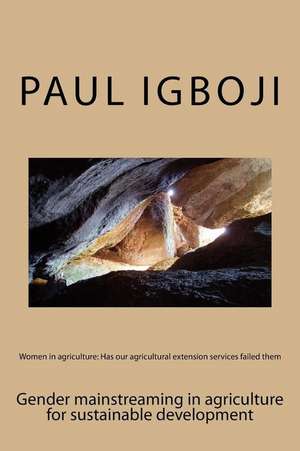Women in Agriculture
Autor Prof Paul Ola Igboji Phd Prefață de Prof Paul Ola Igboji Phden Limba Engleză Paperback
Preț: 318.01 lei
Nou
Puncte Express: 477
Preț estimativ în valută:
60.85€ • 63.69$ • 50.65£
60.85€ • 63.69$ • 50.65£
Carte tipărită la comandă
Livrare economică 31 martie-14 aprilie
Preluare comenzi: 021 569.72.76
Specificații
ISBN-13: 9781536823318
ISBN-10: 1536823317
Pagini: 34
Dimensiuni: 152 x 229 x 2 mm
Greutate: 0.06 kg
ISBN-10: 1536823317
Pagini: 34
Dimensiuni: 152 x 229 x 2 mm
Greutate: 0.06 kg
